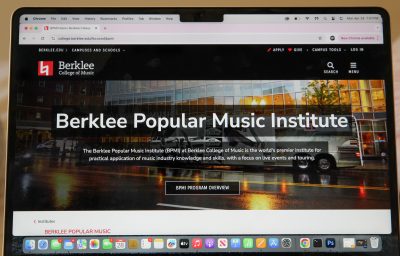Five hundred people, consisting mostly of Berklee College of Music students, filed into Brighton Music Hall April 25 for the sold-out Berklee Popular Music Institute’s 23rd annual showcase.
Before transforming into performers, producers and promoters for the event, the BPMI team shared classrooms and dormitories with many of their fellow Berklee students.

BPMI is an experiential learning program that spans three semesters, during which the 22 selected students work alongside local, Berklee-connected artists to develop their music and give them performing opportunities.
“It single handedly made my tuition worth it,” said Topher Page, a seventh-semester Berklee student who is a member of BPMI’s production and sponsorships team for the showcase.
The fall semester focused on talent scouting, where the class looked for local, Berklee-affiliated artists who they believe have what it takes to be the “next big thing.” Milardo said the class reviews around 300 artists and narrowed it down to the eight who performed in the showcase.
The eight artists — Archon Theory, Axel and Lolo, Jesse Detor, Glasshouse, Dipsea Flower, Park National, Ringpop! and Ryan Mead — were selected after several rounds of voting, in which acts needed more than 50% of the class vote to advance to the next stage.
Page said the class kept the audience in mind and wanted to give attendees a “taste” of different music.
“We went from honky-tonk, to a hip hop group, to some indie pop, to some pop punk,” Page said. “It’s just all over the place.”
The spring semester of the program consisted of developing the artists and organizing the showcase, Milardo said. The event offered Ben and Jerry’s ice cream, a photo booth and raffle tickets for giveaways to major summer music festivals.
“We try to model [the showcase] after a mini music festival,” Milardo said.
Berklee senior Annie Bass, a member of the press and marketing teams for the showcase, spoke on promoting artists.
“I really love music journalism. I also love helping artists and people to express themselves and tell their stories in a way that feels real to them,” Bass said. “Publicity is a really cool way to give artists that platform.”
Bass said watching the artists grow and appeal to fan bases “outside of the Berklee bubble” has been gratifying to see, and she hopes the BPMI program can be a “jumping off point” for the artists.
The crowd consisted of fellow Berklee students who were excited to watch their friends perform and inspired by the program’s success.
In the front row, Berklee freshman Soraya Sullivan and senior Linda Zatloukal cheered wearing trucker hats embroidered with the logo of Ryan Mead, a honky-tonk country artist from Australia.
“He’s one of our best friends,” Sullivan said.
Zatloukal said she and Sullivan were also excited to see Dipsea Flower perform because they admire the band’s songwriting, and Sullivan said it was “cool” to watch their friends and different Berklee bands perform.
Berklee junior Mari Sitzmann is friends with one of the BPMI student organizers and said it’s “inspiring” to be at the showcase.
“It makes me want to also do the same thing,” Sitzmann said. “It’s good for the people that organize it, people that are in the show and the people that come and see it because then it gives the audience opportunities to maybe get involved later if they want to.”
Like Sitzmann, Berklee transfer student Julian Oliver is pursuing a career in the music industry and appreciates seeing that other students are behind the showcase.
“It makes it seem accessible and real and possible,” Oliver said.
Garrett Morrissey, 27, from New Hampshire, said it was his second time attending the showcase. He arrived eager to see Ringpop!, a pop punk band that coined their sound “bubble-punk,” but said Glasshouse became his favorite act of the night.
“They were amazing. I just like their whole vibe, just going from the rap to the smooth tunes in between,” Morrissey said. “Everything about them was very fun.”
Morrissey said it’s great for Berklee students to gain practical experience in their aspiring career field, and he thought BPMI did an “amazing job” putting the event together.
During the third summer semester of the BPMI program, each of the eight artists will be assigned to a three-person team from the class, Milardo said. The groups will then go on tour over the summer and perform at a major music festival — including Lollapalooza, the Governor’s Ball and Warped Tour.
Page said all the artists “have a shot at breaking” big from the showcase and their summer festival appearances.
“You could get some dedicated fans who showed up early [to the festival], and then they see this band they don’t know, and they fall in love,” they said.
Playing major festivals can be daunting for the artists in the program, Page said, but having student promoters, who are also learning, help them prepare for the festivals and “hit the ground running.”
BPMI is the most “hands-on” experience at Berklee, Page said.
“They care about the program, and it shows, it really shows. They do probably more work than they’re paid for,” Page said. “They just really ignite everybody’s passion in this class and get us going and take care of us.”
For Milardo, BPMI is important for preparing the student organizers to speak confidently about their work at Berklee in job interviews. She said being able to say, “I actually did these things,” is very different from being able to say, “I learned these things in a classroom.”
“I want [students] to be able to understand that these high stakes types of events are really critical to the future of their career,” Milardo said. “Once they do it once here, it sets them up to be able to do it again anywhere else in the world, and they have the basic tools needed to do so.”













